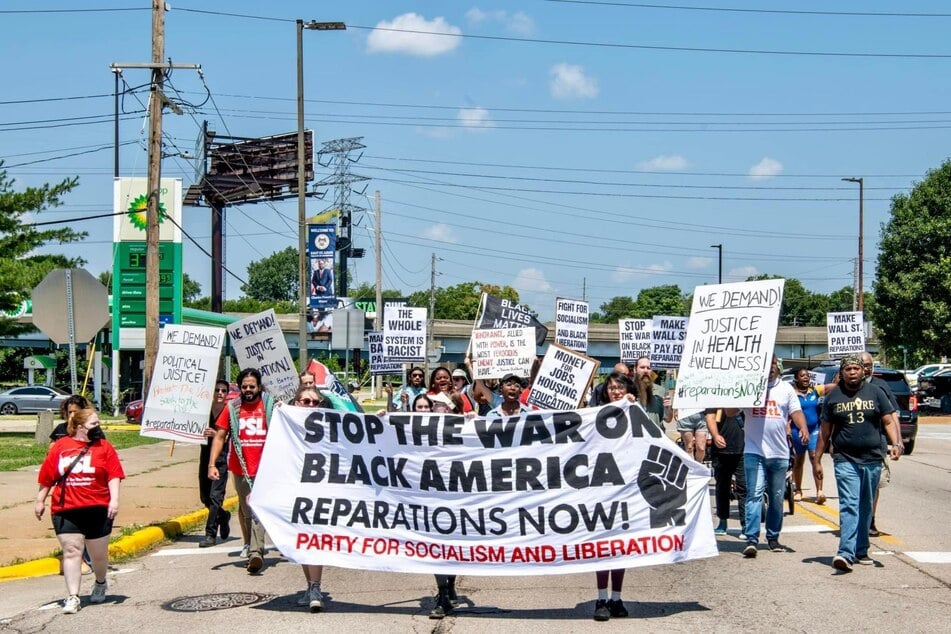Illinois reparations commission to hold East St. Louis community hearing ahead of DNC
East St. Louis, Illinois - Illinois' reparations commission is preparing to hold a public hearing in East St. Louis this weekend – just days before the Democratic National Convention hits the state.

Illinois' African Descent-Citizens Reparations Commission (ADCRC) has announced its next session to take place at East St. Louis High School on Saturday, August 10, at 10 AM CT.
The series of hearings is designed to help the commission gather firsthand insights about the impacts of enslavement and racial discrimination, past and present, on Black communities across the state.
Authorized by 20 ILCS 405/405-540, the ADCRC is tasked with developing policy proposals to address generations of injustice against African-American residents whose ancestors were enslaved.
Among the reparations measures it considers, the commission is directed to issue recommendations to promote the preservation of Black neighborhoods through investments in business development, homeownership, affordable housing, community institutions, and more.
The hearing in East St. Louis is set to take place just weeks after residents marched to commemorate the 107th anniversary of the infamous 1917 race massacre – a horrific act of violence and destruction whose effects may still be felt in the city today.
1917 East St. Louis Race Massacre

The 1917 East St. Louis Race Massacre began while white workers were on strike at Aluminum Ore and the company hired strikebreakers, both Black and white, to fill their positions.
White union leaders were angered when Black workers took up the jobs, despite the enormous obstacles they faced to make a living under Jim Crow apartheid. Some striking workers even took to firing shots at the Black workers and into their homes.
Black communities organized to protect themselves. One night, two Black residents shot at a vehicle driving by and killed what turned out to be two undercover cops in an unmarked car, having mistaken them for attackers.
The retaliation was swift and severe. Accounts from the time describe a white mob setting homes and buildings ablaze, ripping Black babies from their mothers' arms and throwing them into the flames, gunning down Black people, and hanging Black bodies from trees. The Eads Bridge was blocked to prevent Black people from escaping while white law enforcement officers looked on.
Historians believe more than 100 Black people were killed and over 6,000 were forced to flee their homes in the brutal terrorist attack. The NAACP estimated the property damage alone to total at least $400,000 – more than $9.6 million in today's dollars.
The push for federal action on reparations

The ADCRC's public hearing in East St. Louis comes as Illinois prepares to host the 2024 Democratic National Convention in Chicago.
Racial justice advocates have warned that the Democratic presidential ticket must commit to action on reparations – without further delay – if the party wants to win the Black vote in 2024 and defeat Republican nominee Donald Trump.
President Joe Biden and his running mate Kamala Harris expressed support for a federal reparations study while on the campaign trail in 2020 but have so far failed to follow through. Their inaction has called into question whether Harris – this year's Democratic nominee – and her vice presidential pick, Minnesota Governor Tim Walz, will take steps toward reparative justice should they win the White House.
The convention's location in Chicago may present a unique opportunity for grassroots organizers to highlight the urgency of federal reparations, as Illinois has been at the forefront of some of the biggest recent developments in the US movement.
In addition to the ADCRC, the Prairie State is home to Evanston, the first US municipality to extend reparations to Black residents. Chicago Mayor Brandon Johnson announced in June that the metropolis would follow suit with its own reparations task force.
Many advocates have celebrated the momentum these state and local achievements bring to the push for federal action.
Cover photo: Screenshot/Facebook/JD Dixon

